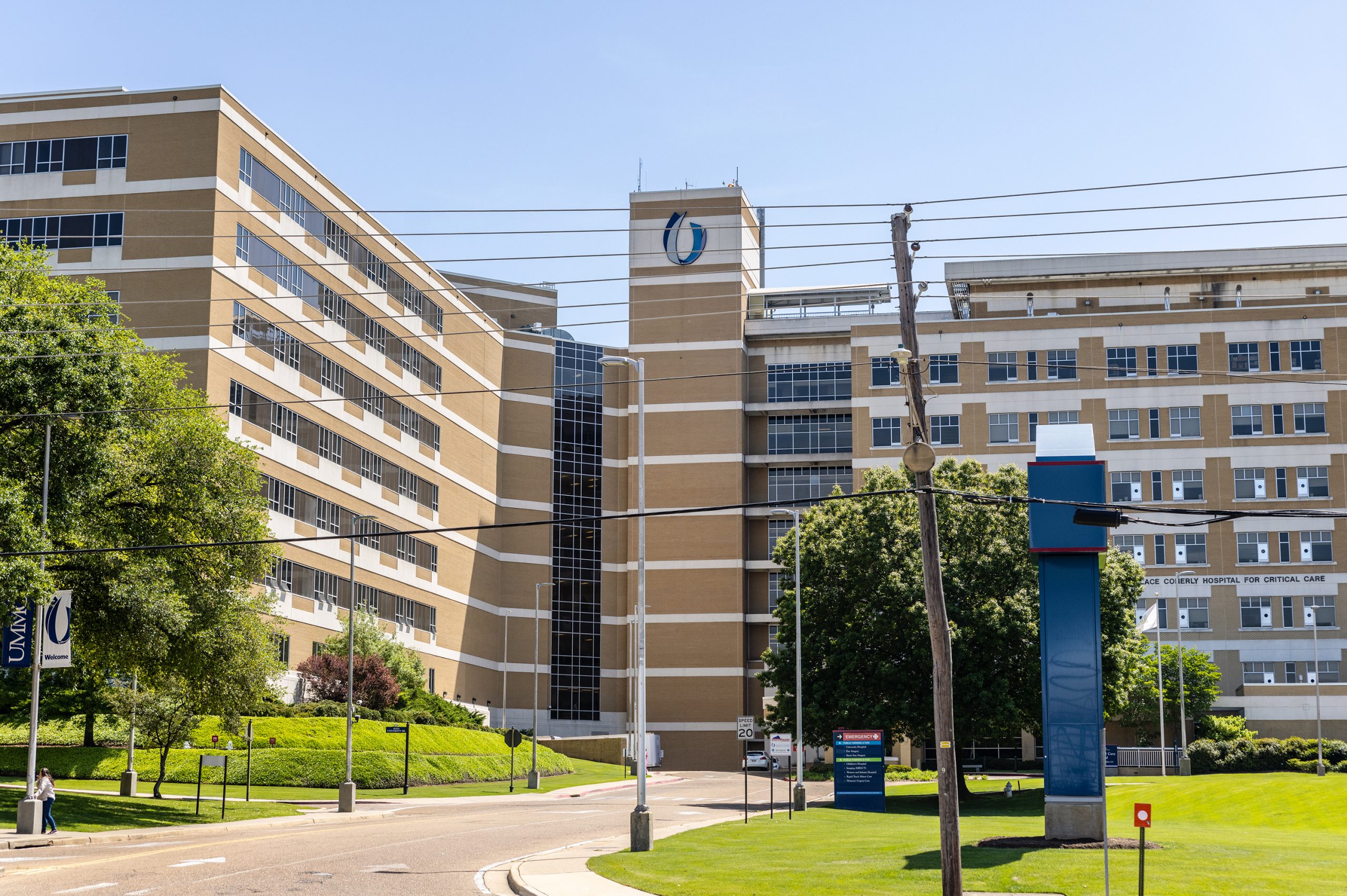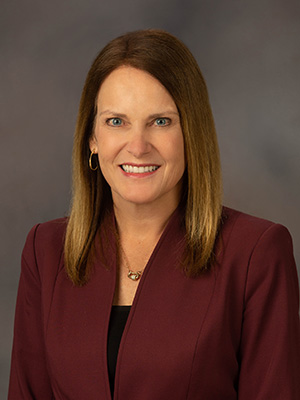Mississippi Today
Former Blue Cross executive takes helm of UMMC finances


The University of Mississippi Medical Center has hired a former Blue Cross and Blue Shield of Mississippi executive as its new chief financial officer.
Jennifer Sinclair will oversee the finances and budget for the entire medical center, according to a release last month from UMMC. Her first day was April 24.
Dr. LouAnn Woodward, vice chancellor for health affairs and dean of the medical school, described the position as “challenging” and introduced Sinclair to the Institutions of Higher Learning trustees at April's health affairs meeting.
“I'm looking forward to it, really,” Sinclair said at the meeting. “My heart and passion and experience are on the provider side, so UMMC is obviously the largest in the state, so I'm excited to be a part of it.”
UMMC is the state's largest public hospital. The medical center was appropriated more than $180 million this year from the Legislature and posted about $1.7 billion in revenues and expenses in fiscal year 2022.
Sinclair, who has more than 23 years of experience as a health care executive, comes to UMMC from Blue Cross where she was vice president. Previously, she was the vice president and regional CFO at Bon Secours Mercy Health, the largest health system in Ohio. She also worked at St. Dominic Memorial Hospital in Jackson for 17 years in several different capacities, including executive vice president of operations and senior vice president of finance.
She graduated from Mississippi State University and is from Morton.
Sinclair replaces Nelson Weichold, who's been in the position just a few months shy of four years. Weichold has accepted a position with Nationwide Children's Hospital in Ohio, his home state.
The reason for his departure has not been disclosed. UMMC could not be reached by press time.
“I want to thank Nelson for his steadfast and exemplary work as our CFO,” Woodward said in the release. “Under his leadership and through his strategic support, UMMC navigated through some unprecedented challenges and the trajectory of the Medical Center is better because of him.”
Weichold was at the helm of the hospital's finances during the COVID-19 pandemic and a nearly year-long dispute between UMMC and Blue Cross, the state's largest private insurer, that put UMMC out of network with the company for months.
“We're not glad that Nelson is leaving,” Woodward said at the meeting. “But we are very glad that we were able to secure somebody like Jennifer and have her join our team.”
This article first appeared on Mississippi Today and is republished here under a Creative Commons license.
Mississippi Today
Podcast: The contentious final days of the 2024 legislative session

Mississippi Today's Adam Ganucheau, Bobby Harrison and Geoff Pender break down the final negotiations of the 2024 legislative session's three major issues: Medicaid expansion, education funding, and retirement system reform.
This article first appeared on Mississippi Today and is republished here under a Creative Commons license.
Did you miss our previous article…
https://www.biloxinewsevents.com/?p=353661
Mississippi Today
Lawmakers negotiate Medicaid expansion behind closed doors, hit impasse on state budget
House and Senate Republicans continued to haggle over Medicaid expansion proposals Sunday, and the state budget process hit a snag after leaders couldn't reach final agreements by a Saturday night deadline on how to spend $7 billion.
House Speaker Jason White on Sunday told his chamber that Medicaid expansion negotiators from the House and Senate had been meeting and he expected a compromise “will be filed by Monday or Tuesday at the latest.”
House Medicaid Chairwoman Missy McGee said the Senate had delivered another counter proposal on expansion Sunday evening but declined to provide details. Her Senate counterpart, Medicaid Chairman Kevin Blackwell, declined comment on Sunday. The two leaders met in McGee's office on Sunday evening following a Saturday afternoon meeting.
READ MORE: House, Senate close in on Medicaid expansion agreement
Lawmakers have for the past couple of months been debating on how to expand Medicaid coverage for poor Mississippians and help the state's flagging hospitals. The House initially voted to expand coverage to an estimated 200,000 people, and accept more that $1 billion a year in federal dollars to cover the cost, as most other states have done. The Senate initially passed a far more austere plan, that would cover about 40,000 people, and would decline the extra federal money to cover costs.
Since those plans passed, each has offered counter proposals, but no deal has been reached.
A group of about 50 clergy, physicians and other citizens who support full expansion showed up at the Capitol on Sunday to sit in the Senate gallery and deliver letters to key leaders who are negotiating a final plan.
“When we stand before the Lord, he's not going to ask how much money did you save the state. He's going to ask you what you did for the least of these,” Monsignor Elvin Sounds, a retired Catholic priest, said outside the Senate gallery on Sunday.
READ MORE: A solution to the Republican impasse on Medicaid expansion
Lawmakers hit an impasse on setting a $7 billion state budget and missed Saturday night's deadline for filing appropriations bills. This will force the legislature into extra innings, and require lawmakers to vote to push back deadlines. Lawmakers had expected to end this year's session and leave Jackson by early this week. But House Speaker Jason White told his chamber on Sunday they should expect to continue working through Friday, “and possibly through Saturday or Sunday.
White later said of the budget impasse, “When you get to haggling over spending $7 billion, folks are going to have disagreements.”
Lt. Gov. Delbert Hosemann, who presides over the Senate, said “things are fluid. But everybody is working.”
He looked at his watch and said “It is 5 o'clock. By 6 o'clock what I tell you will have changed.”
White said one reason for the session having to run extra innings is that when he became speaker he vowed to House members that he would not continue the practice of passing much of the state budget last-minute, late at night or in the wee hours of the morning with little or no time for lawmakers to read or vet what they are passing.
He said the House was prepared early Saturday night to file budget bills with agreed-upon numbers, but not to file “dummy bills” with zeros or blanks and continue haggling a budget late into the night.
“I made a promise that we are not going to keep them up here until midnight, then plow through all these budget bills,” White said. “We had had a gentleman's agreement (between the House and Senate) earlier in the session to negotiate a budget by April 15. That didn't happen … We are not going to do everything last minute with no time for our members to read things and ask questions. We are not going to do it in the middle of the night.”
READ MORE: Senate negotiators a no-show for second meeting with House on Medicaid expansion
This article first appeared on Mississippi Today and is republished here under a Creative Commons license.
Mississippi Today
On this day in 1951


April 28, 1951

Ruby Hurley opened the first permanent office of the NAACP in the South.
Her introduction to civil rights activism began when she helped organize Marian Anderson's 1939 concert at the Lincoln Memorial. Four years later, she became national youth secretary for the NAACP. In 1951, she opened the organization's office in Birmingham to grow memberships in Alabama, Florida, Georgia, Mississippi and Tennessee.
When she arrived in Mississippi, there were only 800 NAACP members. After the governor made remarks she disagreed with, she wrote a letter to the editor that was published in a Mississippi newspaper. After that step in courage, membership grew to 4,000.
“They were surprised and glad to find someone to challenge the governor,” she told the Chicago Defender. “No Negro had ever challenged the governor before.”
She helped Medgar Evers investigate the 1955 murder of Emmett Till and other violence against Black Americans. Despite threats, she pushed on.
“When you're in the middle of these situations, there's no room for fear,” she said. “If you have fear in your heart or mind, you can't do a good job.”
After an all-white jury acquitted Till's killers, she appeared on the front cover of Jet magazine with the headline, “Most Militant Negro Woman in the South.”
Months later, she helped Autherine Lucy become the first Black student at the University of Alabama.
For her work, she received many threats, including a bombing attempt on her home. She opened an NAACP office in Atlanta, where she served as a mentor for civil rights leader Vernon Jordan, with whom she worked extensively and who went on to serve as an adviser to President Bill Clinton.
After learning of Evers' assassination in 1963, she became overwhelmed with sorrow. “I cried for three hours,” she said. “I shall always remember that pool of blood in which he lay and that spattered blood over the car where he tried to drag himself into the house.”
She died two years after retiring from the NAACP in 1978, and the U.S. Post Office recognized her work in the Civil Rights Pioneers stamp series. In 2022, she was portrayed in the ABC miniseries, “Women of the Movement.”
This article first appeared on Mississippi Today and is republished here under a Creative Commons license.
-
Local News4 days ago
Sister of Mississippi man who died after police pulled him from car rejects lawsuit settlement
-
Mississippi Today4 days ago
At Lake High School in Scott County, the Un-Team will never be forgotten
-
Mississippi Today24 hours ago
On this day in 1951
-
Mississippi News2 days ago
One injured in Mississippi officer-involved shooting after chase
-
Mississippi News7 days ago
Cicadas expected to takeover north Mississippi counties soon
-
Mississippi News6 days ago
Viewers make allegations against Hatley teacher, school district releases statement – Home – WCBI TV
-
Mississippi News Video5 days ago
Vehicle struck and killed man lying in the road, Alcorn County sheriff says
-
Mississippi Today7 days ago
On this day in 1892





































